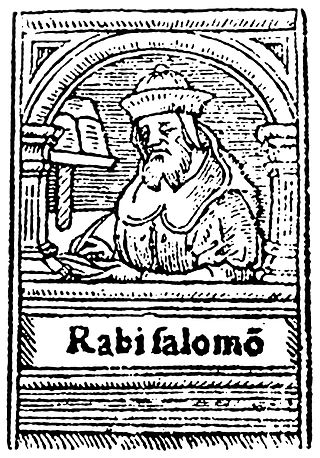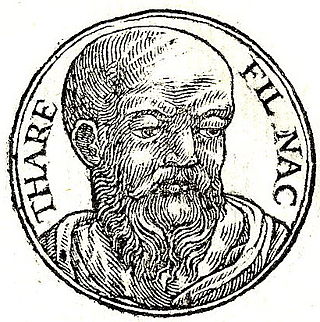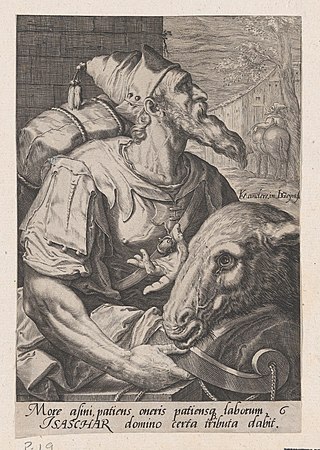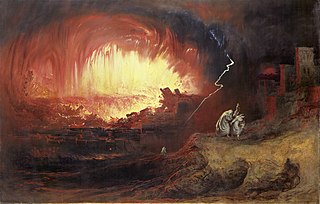
Isaac is one of the three patriarchs of the Israelites and an important figure in the Abrahamic religions, including Judaism, Christianity, and Islam. Isaac first appears in the Torah, in which he is the son of Abraham and Sarah, the father of Jacob and Esau, and the grandfather of the twelve tribes of Israel.

Shlomo Yitzchaki, commonly known by the acronym Rashi, was a French rabbi who authored comprehensive commentaries on the Talmud and Hebrew Bible.

Amalek is described in the Hebrew Bible as the enemy nation of the Israelites. The name "Amalek" can refer to the descendants of Amalek, the grandson of Esau, or anyone who lived in their territories in Canaan, or North African descendants of Ham, the son of Noah.

Terah or Terach is a biblical figure in the Book of Genesis. He is listed as the son of Nahor and father of the patriarch Abraham. As such, he is a descendant of Shem's son Arpachshad. Terah is mentioned in Genesis 11:26–27, Book of Joshua 24:2, and 1 Chronicles 1:17–27 of the Hebrew Bible and Luke 3:34–36 in the New Testament.

Sarah is a biblical matriarch, prophet, and major figure in Abrahamic religions. While different Abrahamic faiths portray her differently, Judaism, Christianity, and Islam all depict her character similarly, as that of a pious woman, renowned for her hospitality and beauty, the wife and half-sister of Abraham, and the mother of Isaac. Sarah has her feast day on 1 September in the Catholic Church, 19 August in the Coptic Orthodox Church, 20 January in the LCMS, and 12 and 20 December in the Eastern Orthodox Church.

In the biblical Book of Genesis, Ishmael was the first son of Abraham. His mother was Hagar, the handmaiden of Abraham's wife Sarah. He died at the age of 137. Traditionally, he is seen as the ancestor of the Arabs.

According to the Book of Genesis, Hagar was an Egyptian slave, a handmaiden of Sarah, whom Sarah gave to her own husband Abram as a wife to bear him a child. Abraham's firstborn son, through Hagar, Ishmael, became the progenitor of the Ishmaelites, generally taken to be the Arabs. Various commentators have connected her to the Hagrites, perhaps claiming her as their eponymous ancestor. Hagar is alluded to, although not named, in the Quran, and Islam considers her Abraham's second wife.

Issachar was, according to the Book of Genesis, the fifth of the six sons of Jacob and Leah, and the founder of the Israelite Tribe of Issachar. However, some Biblical scholars view this as an eponymous metaphor providing an aetiology of the connectedness of the tribe to others in the Israelite confederation.

Reuben or Reuven was the first of the six sons of Jacob and Leah, according to the Book of Genesis. He was the founder of the Israelite Tribe of Reuben.

Jacob ben Meir, best known as Rabbeinu Tam, was one of the most renowned Ashkenazi Jewish rabbis and leading French Tosafists, a leading halakhic authority in his generation, and a grandson of Rashi. Known as "Rabbeinu", he acquired the Hebrew suffix "Tam" meaning straightforward; it was originally used in the Book of Genesis to describe his biblical namesake, Jacob.
Moshe haDarshan was chief of the yeshiva of Narbonne, and perhaps the founder of Jewish exegetical studies in France. Along with Rashi, his writings are often cited as the first extant writings in Zarphatic, the Judæo-French language.
Nebaioth or Nebajoth is mentioned at least five times in the Hebrew Bible, according to which he was the firstborn son of Ishmael, and the name appears as the name of one of the wilderness tribes mentioned in the Book of Genesis 25:13, and in the Book of Isaiah 60:7.
Pilegesh is a Hebrew term for a concubine, a female, unmarried sexual slave of social and legal status inferior to that of a wife. Among the Israelites, some men acknowledged their concubines, and such women enjoyed the same rights in the house as legitimate wives.

Vayeira, Vayera, or Va-yera is the fourth weekly Torah portion in the annual Jewish cycle of Torah reading. It constitutes Genesis 18:1–22:24. The parashah tells the stories of Abraham's three visitors, Abraham's bargaining with God over Sodom and Gomorrah, Lot's two visitors, Lot's bargaining with the Sodomites, Lot's flight, the destruction of Sodom and Gomorrah, how Lot's daughters became pregnant by their father, how Abraham once again passed off his wife Sarah as his sister, the birth of Isaac, the expulsion of Hagar, disputes over wells, and the binding of Isaac.

Chayei Sarah, Chaye Sarah, Ḥayye Sarah, or Ḥayyei Sara, is the fifth weekly Torah portion in the annual Jewish cycle of Torah reading. It constitutes Genesis 23:1–25:18. The parashah tells the stories of Abraham's negotiations to purchase a burial place for his wife Sarah and his servant's mission to find a wife for Abraham's son Isaac.

In the Hebrew Bible, Melchizedek was the king of Salem and priest of El Elyon. He is first mentioned in Genesis 14:18–20, where he brings out bread and wine and then blesses Abram, and El Elyon or "the Lord, God Most High". Abram was returning from pursuing the kings who came from the East and gave him a "tenth of everything".
Jewish commentaries on the Bible are biblical commentaries of the Hebrew Bible from a Jewish perspective. Translations into Aramaic and English, and some universally accepted Jewish commentaries with notes on their method of approach and also some modern translations into English with notes are listed.
Shuah is the name of one of four minor Biblical figures. It is sometimes used as the name of a fifth. Their names are different in Hebrew, but they were all transliterated as "Shuah" in the King James Version.
According to the Hebrew Bible, Midian is the fourth son of Abraham and Keturah, the woman Abraham married after Sarah's death. His brothers are Zimran, Jokshan, Medan, Ishbak and Shuah. His sons are Ephah, Epher, Enoch, Abida, and Eldaah.

Erusin is the Hebrew term for betrothal. In Modern Hebrew, erusin means engagement, but this is not the historical meaning of the term, which is the first part of marriage, the second part being the nissuin "nuptials".















